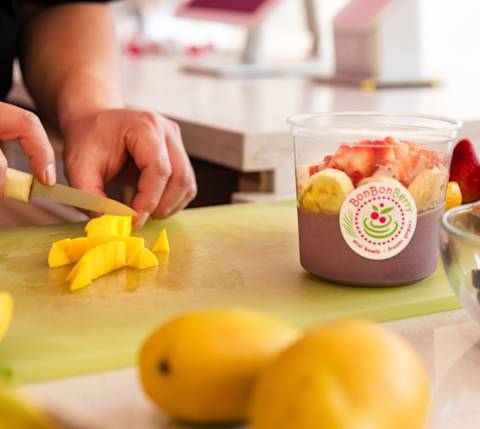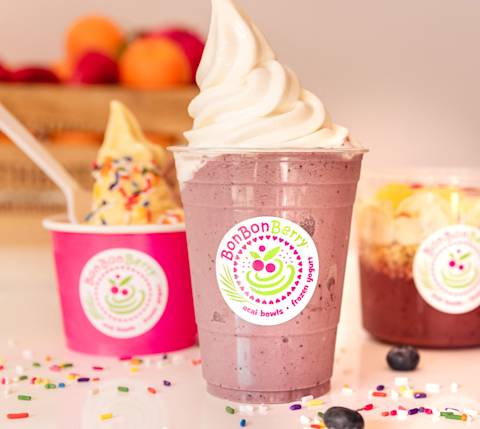May is Asian American and Pacific Islander Heritage Month, and we’re celebrating the richness and diversity in the AAPI community this month and beyond. Read on for the stories of three restaurateurs who have nourished their neighborhoods, honored their cultures, and are ingrained in the fabric of their communities.
Hanson Li, Lazy Susan
While Hanson Li’s career as a restaurateur is his second wind, it’s also a realization of a childhood dream. After growing up in Hong Kong, Taiwan, and Malaysia, Hanson and his family moved to Rochester, New York when he was 14 years old. Anytime the family would go to their local restaurant, his father always wondered why there was no mainstream Chinese chain restaurant that delivered.
It was a question that stayed with him over the decades. In 2014, after a demanding, decade-long career in finance and turning 40, Hanson wanted to pursue other passions. "I was away from my family because of work and asked myself what I wanted to do for the rest of my career," he says. "I wrote a business plan for myself and looked at what I wanted out of the second phase of my career because I love hospitality and food."

We're really focused on the classic American Chinese dishes in the genre, but in a way that is adapted for how we eat today. Two-thirds of our dishes are gluten-free.
In 2020, he started working on Lazy Susan with his business partner Tiffany Yam (whose parents owned a Chinese restaurant) and launched it as a takeout-only restaurant in February 2021. Lazy Susan serves 25 of the most popular American Chinese dishes, in what Hanson describes as “OG Chinese food,” like chow mein, kung pao chicken, and fried rice. "We’re focusing on Chinese dishes that I think every single American has had in their lives," he says.
Redefining authenticity
For Hanson, opening up an American Chinese restaurant directly challenges the notion of what "authentic" Chinese food is. While Hanson has encountered people who approach him with their misconceptions of what Lazy Susan — and Chinese food — should be, he knows that authenticity doesn’t have to be narrowly defined. "You can love a good chow mein or beef with broccoli. You can also like the authentic Szechuan spicy dishes," Hanson says. "It doesn't have to be one or the other." Ultimately, Lazy Susan is about sharing the love of good food with others; that ethos is even seen in the name.

A lazy susan is a circular device designed for communal eating. Embedded in our name is a story about a kind of Chinese-Americanness behind the lazy susan. There's an act of eating together that I love, and I love being able to give that to people.
Tee Tran, Monster Pho
Tee Tran, owner of Monster Pho, grew up in Oakland and calls it home. But his story starts in Vietnam, where he and his family were part of the million refugees who fled in the 1980s.
Tee was only two at the time, but remembers hearing stories of their escape with his mom, Tina Le, leading the way. "She grabbed me, my older brothers, and my auntie, and we fled on a boat that was maybe 20 feet long with about a hundred people," Tee says. "We escaped in the middle of the night, trying to make it out of the country without getting caught by the communists, and went to Thailand."
They spent two years in refugee camps in Thailand and the Philippines, where Tina had supported the family by trading gold she hid on her journey to open up a storefront selling food and supplies. When they arrived in Oakland three years later, Tee vividly remembers the family’s tumultuous beginnings. "I remember when all of us would have to sleep in the living room and we had nothing—only what we brought with us to America," he says. "My mom worked four, five jobs at the time, trying to put food on the table and save as much as she could."
Throughout the various jobs Tina had—dishwasher, babysitter, caretaker—her cooking was beloved in the neighborhood. "Her food was a hit with neighbors, friends, everyone. I always told her that she should open up her own restaurant, but she would always say she didn’t know what she was doing," Tee says. "When I was a kid, I would tell her 'One day, I’m gonna open a restaurant for you.'" Over 20 years later, he kept his word.
Tee worked at a BMW dealership after graduating high school and became one of the top salesmen two years later, but working there was not part of his long-term plans. "I loved my customers, but hated the business and wanted to get out of it," he says. He applied for a business loan and even though he was denied, it didn’t deter him. After saving up for a down payment, he found a print shop for rent across from the dealership. For the next two years, Tee worked on converting the space into a restaurant while still working full-time. "I worked six days a week, from 9 a.m. to 2 a.m. sending emails and setting up meetings, then waking up again at 7 a.m. to get ready for work," he says.
Turning dreams into reality
When Tee opened Monster Pho in March 2014, he knew exactly what the restaurant was going to serve: traditional, fresh Vietnamese food, made the way he remembers as a kid. "Our restaurant is very traditional—we use the same ingredients and techniques my grandma taught my mom," he says. "Fusion is great, but we just love comfort food." The community has embraced Tee’s comforting classics with their signature pho, bánh mì sandwiches, and spring rolls.
Monster Pho has been in business for over eight years now, and Tee has enjoyed seeing his community blossom and customers evolve to become extended family. "80% of our customers are regulars and they’ve been very supportive," he says. "I’ve seen kids graduate high school and go to college and have kids."
Giving back
The love that Tee has for his community, and the values his mom instilled, inspire him to continue to nourish his community, especially during difficult times. During the pandemic, Monster Pho donated over 30,000 meals, gave free coffee to healthcare workers, and organized a donation drive where customers who gave much-needed PPE received 50% off their meals.
Their generosity didn’t go unnoticed. In December 2020, Tee and Tina were invited to the Tamron Hall show–and Steph and Ayesha Curry surprised the duo with a $25,000 donation to their restaurant. "We were so thankful for the check, but we also realized that there are people that need it more than us," he says. "We came up with an idea that on January 1, we’ll donate free food for everybody. I gave out free pho any time, anywhere, any location — no questions asked."
The response was positively overwhelming. "I thought there would be a few customers here and there, but we had 500 people lined up on the first day," he says. And even though the free pho giveaway is long over, the restaurant still honors it if someone asks.

It’s the way that I was taught—you gotta take care of people. If you can help someone with one meal for them to save $10-15 to spend on their family, that means you've done the right thing.
For Tee, being a part of the AAPI community as a restaurateur is a manifestation of the American dream.
"I’m an immigrant kid who had nothing in America; my mom worked five to six jobs. I barely graduated high school and everyone pretty much gave up on me," he says. "But to be the person I am today and be doing what I’m doing — this is what I love about not just being Asian, but being in America. It’s opened up opportunities for me."
Michael Lee, Bon Bon Berry
For Michael, co-owner of Bon Bon Berry, leaving the corporate world and transitioning to being a business owner wasn’t part of his plan — but coming to America wasn’t, either. Michael grew up in Hong Kong and decided to enroll in a foreign exchange program at 16, leaving his family behind almost 8,000 miles away. Looking to expand his worldview and eager for a change of pace, he moved to Springfield, Massachusetts, staying with a host family. "I wanted to rediscover myself, so picking a place that you know nothing about is a great way to start," he says. "I don’t regret it; it molded me into who I’ve become today."

A leap of faith
After graduating high school in Springfield, Michael moved to Los Angeles and went to the University of Southern California, then worked as an accountant for over a decade. Ten years ago, Michael and his wife, Bonnie Tong, were looking for a change of pace from their careers and thought about opening an acai shop. "My wife came up with the very brilliant idea of opening up an acai shop," Michael says. "At the time, acai was still a new thing and it wasn’t that popular, but Bonnie had acai before on a trip to Hawaii and loved it."

Without any restaurant experience, they quickly tapped into their local restaurant community, attending trade shows and frequenting restaurant forums to learn more about the industry and prepare themselves for opening a new restaurant. When they opened in 2014 in West Los Angeles, acai was just emerging as a superfood in the US.
The best of both worlds
For Michael, being a restaurateur means incorporating some of the tenets of his Chinese upbringing and experiences in America. "I think about how I can incorporate the old Chinese ways with some of the new American values and come up with something of my own," he says.
At Bon Bon Berry, this merging of two cultures is personified by putting his employees and customers first, not taking shortcuts to ensure the best experience for his customers, and rolling up his sleeves whenever he’s needed—even for the most menial of tasks. "I do everything in the shop, even the 'dirty' work that people wouldn’t think an owner will do," he says. "But if my employees see me doing it, they hopefully won’t think that it’s bad; it’ll just be another task that has to be done."

There are so many different kinds of leadership, but I like to lead by example.
While Michael is heavily involved in the day-to-day running of Bon Bon Berry, he gives the utmost credit to Bonnie for Bon Bon Berry’s success. "My wife being my support is very important to me," he says. "She gives me the confidence to do what we do, and we’re in this together."




